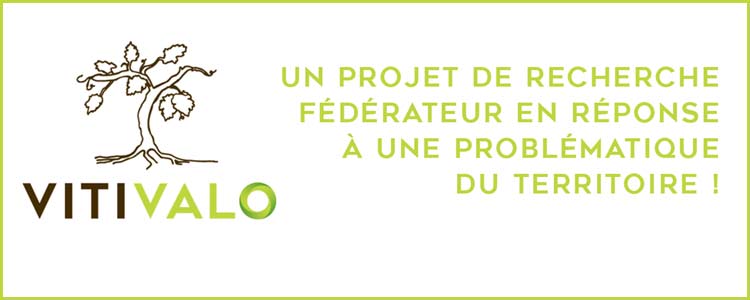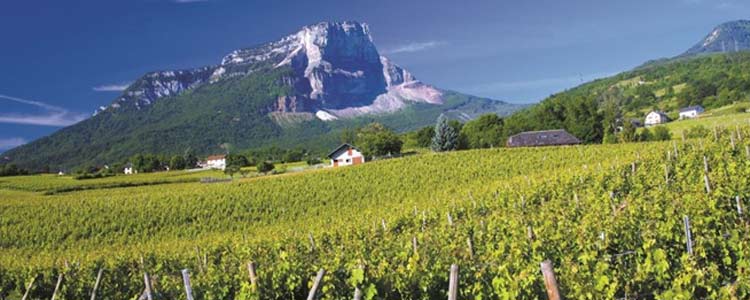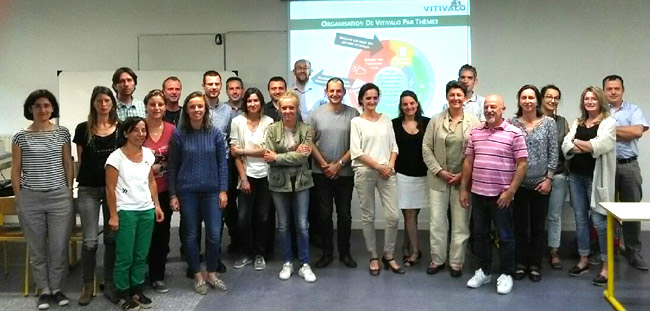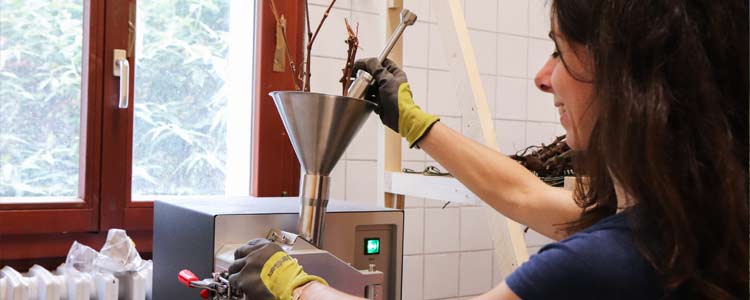[News]
Vitivalo
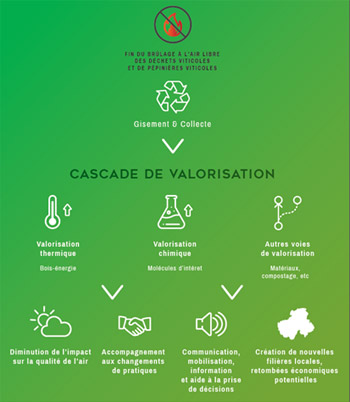
Since the end of December 2017, a prefectoral decree has prohibited the open burning of agricultural waste, including that from winegrowing activities, in order to reduce sources of fine particle emissions in the Savoy region (a region subject to numerous episodes of fine particle pollution in winter). In the vineyards of the Pays de Savoie, which are located on hillsides and therefore difficult to access, wood from annual cuttings is traditionally burnt on site as it is pruned in winter. Savoie also has a large number of vine nurseries (70% of French vines are produced here), which also dispose of their wood waste by burning.
The VITIVALO project was therefore launched byUniversité Savoie Mont Blanc in the spring of 2017, with the aim of developing new, sustainable winegrowing waste recovery channels in a circular economy context, involving numerous professional, institutional, public, academic and associative partners in the region.
The VITIVALO projectfocuses on two main complementaryareas of research: (1) limiting the environmental impact of the winegrowing sector on air quality, and (2) developing new local value chains for winegrowing waste in the form of chemical, thermal and materials recovery, etc.
WHAT WASTE IS INVOLVED?
The VITIVALO project concerns all wood waste from viticulture and vine nurseries. A recent study carried out as part of the project not only identified the quantities available on the Savoyard territory, but also inventoried all the practices used by professionals. Today, this production of wood waste is estimated at almost 30,000 m3 per year.
RESEARCH AREAS
When wood waste is burned in the open air, the quantities of fine particles and toxic pollutants emitted will depend on several factors: the type of waste (vine shoots, stumps, grape varieties), the humidity of the waste, the weather conditions during burning and the techniques used to carry out the burning. Very little is known about these aspects in the scientific literature. There is therefore a real lack of data on emission factors and inventories of practices in the Pays de Savoie region. Based on the sampling methods already used at the LCME and in partnership with winegrowing professionals and Atmo Auvergne Rhône-Alpes, field measurements will be carried out to identify and quantify fine particles and the main toxic and hazardous compounds emitted during the open burning of winegrowing waste, depending on a number of parameters.
The project's innovation is based on the implementation of cascades of valorization, with chemical valorization as the initial step. Indeed, winegrowing waste is a major renewable source of high value-added molecules, such as powerful antioxidants and probably strong mediators of biological effects (anti-inflammatories, potential treatment of Alzheimer's disease, etc.) that are of interest to the chemical industry today. The aim of extracting these molecules from winegrowing waste is to add value and create the potential for economic exploitation of this waste by local companies. Priority will be given to molecules of interest to the cosmetics industry, but other molecules may also be identified during the extraction and analysis phases. Technologically, these extraction processes will be innovative and based on more eco-friendly green chemistry methods. The various recovery scenarios will take into account the environmental impact of the processes implemented, and will be assessed using Life Cycle Analyses (LCA), comparing open burning, material recovery and/or incineration in boilers.
HOW DOES THE PROJECT WORK?
The VITIVALO project is led by theUniversité Savoie Mont BlancThe VITIVALO project is led by the University of Savoie Mont Blanc, and in particular by two lecturers from the Laboratoire de Chimie Moléculaire et Environnement of theUFR Sciences et Montagne: Christine PIOT and Grégory CHATEL. Their role is to coordinate the project (liaising between partners, leading working groups, internal and external communication, expertise, etc.) and to seek funding for the studies needed to achieve the objectives. They are also scientific experts in the fields of air quality (chemical measurements and characterizations) and chemical waste recovery (production of high value-added molecules via environmentally acceptable processes).
The project is then organized into four working groups in which each partner can contribute, from the idea stage to the implementation of concrete or financed actions:
- AIR Group
- GISEMENT Group
- VALO Group
- COMM Group
HOW IS THE PROJECT FINANCED?
Like all research projects, the VITIVALO project needs funding to achieve its objectives. Financial support was quickly obtained thanks to the dynamism of the consortium set up:
- Doctoral thesis co-financed by ADEME and the Savoie Mont Blanc Council, on the chemical recovery of winegrowing waste (€100,000, November 2017- November 2020).
- Student project on the inventory of waste and practices on the territory financed by local partners (Communauté de Communes Cœur de Savoie, Syndicat des Vins de Savoie, Syndicat des Pépiniéristes Viticoles de Savoie, GDA Cœur de Savoie and Chambre d'Agriculture Savoie Mont Blanc; 4800 €, September 2017- June 2018)
- AAP Montagne, internal toUniversité Savoie Mont Blanc on air quality (€9,000, January 2018-December 2018)
- Fondation USMB for laboratory equipment (€60,000 in 2018, renewable in 2019)
- Crédit Agricole des Savoie for communication (€3,000 for 2018-2020).
- CSMB of €26,000 in 2019 to measure atmospheric emissions from the open burning of wood waste from vineyards.
- The industrial composting study to be carried out in 2019 on the Grand Chambéry platform operated by SUEZ: financing and provision of the platform by Grand Chambéry; operational implementation of the study by SUEZ Organique.
- A study of soil improvement with wood waste from vineyards using the Bois Raméal Fragmenté technique: financed by the commune of La Motte Servolex, the Syndicat des Pépiniéristes viticoles and the Communauté de Communes Coeur de Savoie; the study was hosted on communal land in La Motte Servolex.
Other requests for funding are underway.
Since June 6, 2018, citizens and companies have also been able to fund Research as part of the VITIVALO project via the Université Savoie Mont Blanc Foundation's donation platform. These donations are tax-deductible.
project partners
The originality of the VITIVALO project lies in the fact that theUniversité Savoie Mont Blanc is the project leader, bringing all the players involved to the table through coordination and a "neutral" and "scientific" approach from the University.
After several exchanges, many partners took part in an initial brainstorming meeting on June 6, 2017.
Exactly one year on, on June 6, 2018, the VITIVALO project held its official launch event, at the Presidency of theUniversité Savoie Mont Blanc, in Chambéry.
Research partners
- Université Savoie Mont Blanc (USMB) and its research laboratories:
- The USMB Foundation
- USMB Business Club
- AMVALOR subsidiary (Arts et Métiers, Institut de Chambéry)
Wine professionals
- Syndicat régional des Vins de Savoie
- Syndicat des pépiniéristes viticoles de la Savoie (Savoy wine nursery association)
- French Institute of Vine and Wine
Numerous winegrowers and nurserymen are also taking part in individual experiments as part of the VITIVALO project.
Territories
- Bauges Regional Nature Park
- Communities of Communes Coeur de Savoie
- Communities of Communes Grand Chambéry
- The commune of La Motte Servolex
- Savoie Mont Blanc Council (CSMB)
State, Territorial, Environment, Agriculture and Industry departments
- Savoie Departmental Territory Directorate (DDT73)
- Direction Régionale de l'Environnement, de l'Aménagement et du Logement (DREAL, Unité Interdépartementale des deux Savoie et Unité Régionale Auvergne-Rhône-Alpes)
- Direction Régionale de l'Alimentation, de l'Agriculture et de la Forêt de la région Auvergne-Rhône-Alpes (DRAAF Auvergne-Rhône-Alpes)
- Savoie Mont Blanc Chamber of Agriculture
- French Institute of Vine and Wine
- Savoie Chamber of Commerce and Industry (CCI)
- Vaucluse Chamber of Agriculture - Provence-Alpes Côte d'Azur
- Auvergne Rhône-Alpes Entreprises, Savoie office
- Atmo Auvergne-Rhône-Alpes Observatory
Associations
- Association Savoyarde pour le Développement des Energies Renouvelables (ASDER) (Savoy Association for the Development of Renewable Energies)
- Association de l'Agriculture Biologique en Auvergne-Rhône-Alpes (ADABio, Savoie branch)
- Association Santé Environnement en Combes de Savoie
Companies
- INDDIGO design office
- Amarilis design office
- TRIALP
- Crédit Agricole des Savoie
You want to take part in the project
Are you a professional, an elected official, a company, an association or a private citizen interested in taking part in the VITIVALO project, either logistically or experimentally?
Please contact the project leaders by e-mail :
you want to finance the project
A collaborative funding platform is available on the Fondation Université Savoie Mont Blanc website, via the link below. Whether you are a private individual or a company, your donation to support the VITIVALO project is tax-deductible.
Social networking
BY MAIL
BY MAIL
Université Savoie Mont Blanc - LCME
VITIVALO project
Campus scientifique de Savoie Technolac, Bâtiment 8C
73376 LE BOURGET-DU-LAC CEDEX
